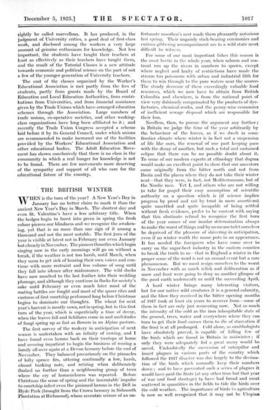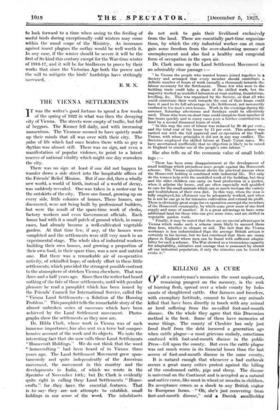THE BRITISH WINTER
WHEN- is the turn of the year? A New Year's Day in - January rn has no better claim to mark it than the ancient New Year's Day in March. The shortest day and even St. Valentine's have a less arbitrary title. When the hedges begin to burst into green in spring the fresh colour pierces our blindness and we recognize the awaken- ing, yet that is no more than one sign of it among a thousand and not the most notable. The first urn of the year is visible at latest not in February nor even January but already in November. The pioneer throstles which begin singing now in the early mornings will go on without a break, if the weather is not too harsh, until March, when they seem to get sick of hearing their own voices and con- tinue with more restraint and less volume of song until they fall into silence after midsummer. The wild ducks have now moulted to the last feather into their wedding plumage, and although they continue in flocks for society's sake until February or even much later most of the mating battles are fought and most of the queer rites and Customs of first courtship performed long before Christmas begins to dominate our thoughts. The wheat for next year's harvest is mostly sown, not in spring, but in this first turn of the year, which is superficially a time of decay, when the leaves fall and fieldfares come in and multitudes of fungi spring up as fast as flowers in an Alpine pasture.
The first survey of the rookery in anticipation of next season is undertaken with an infinity of cawing, and have found even herons back on their treetops at home and seeming impatient to begin the business of rearing a family all over again at a Devon heronry before the end of November. They balanced precariously on the pinnacles of lofty spruce firs, uttering continually a low,- harsh, almost barking note, and retiring when deliberately flushed no further than a neighbouring group of trees -*here the cry of hoinesickness was repeated. Before Christinis. the sense of spring and- the inscrutable-impulse to *courtship infect-even the pinioned heronsin the Dell in nyde Park .(brought.from the Crown heronry in Sidmouth Plantation at Richmond), whose eccentric seizure of an un- fortunate moorhen's nest made them pleaiantly notorious last spring. Their ungainly stick-bearing ceremonies and curious gibbering accompaniment are in 'a wild state most difficult to witness.
For some of our most important fishes this season is the most hectic in the whole year, when salmon and sea- trout run up the rivers in numbers to spawn, except where neglect and laxity of restrictions have made the stream too poisonous with urban and industrial filth for them to win through to the pure waters near the source. The steady decrease of these exceedingly valuable food resources, which we now have to obtain from British Columbia and elsewhere, is from the national point of view very dubiously compensated by the products of dye- factories, chemical-works, and the penny-wise economies of inefficient sewage disposal which are responsible for their loss.
Needless, then, to pursue the argument any further ; in Britain we judge the time of the year arbitrarily by the behaviour of the leaves, as if we dwelt in some frostier climate where winter is in fact not a suspension of life like ours, the renewal of one part keeping pace with the decay of another, but such a total and sustained eclipse that there can be no possible doubt about it. To some of our modern experts at ethnology that dogma would make an excellent point to show that our ancestors came originally from the bitter north and not from Iberia and the places where they do not take their winter neat—that they were, in fact, not Mediterrancans, but of the Nordic race. Yet I, and others who are not willing to take for gospel their easy assumption of scientific authority on a question which is (if science implies progress by proof and not by trust in mere assertions) quite unsettled and quite incapable of being settled without fresh evidence, prefer to be content with saying that this obstinate refusal to recognize the first turn of the year comes of our insular determination always to make the worst of things and by no means to let ourselves be deprived of the pleasure of shivering in anticipation, even if no winter worth the name puts in an appearance. It has needed the foreigners who have come over to carry on the sugar-beet industry in the eastern counties to break the truth to us—that in England a winter in the proper sense of the word is not an annual event but a rare phenomenon. But we must resign ourselves to the worst in November with as much relish and deliberation as if snow and frost were going to deny us another glimpse of the good earth underneath us until the succeeding April.
A hard winter brings many interesting visitors, but for our native wild creatures it is a general calamity, and the blow they received in the bitter opening months of 1917 took at least six years to recover from—some of them in fact are only just recovering now. Not so much the intensity of the cold as the iron inhospitable state of the ground, trees, water and everywhere where they can turn to get their food causes them to die of starvation if the frost is at all prolonged. Cold alone, as ornithologists have absolutely proved, is capable of killing few of the birds which are found in Britain in midwinter ; if only they were adequately fed a great many would be saved. Undoubtedly the succession of caterpillar and insect plagues in various parts of the country which followed the 1917 disaster was due largely to the decima- tion of the birds which normally keep their numbers doWn ; and to have prevented such a series of plagues it wank( have paid the State (at any other time but-that year -of war and food shortage) to have had bread and meat scattered in quantities in the fields to tide the birds over the cold weather. The importance of 'birds to agriculture is now so well recognized that it may not be Utopian to look forward to a. time when' seeing to the feeding of useful-birds during exceptionally cold winters may come within the usual cope of the Ministry. As insurance against insect plagues the outlay would be well worth it. In any case, if the winter should be severe it will be the first of its kind.this century except for the War-time winter of 1916-17, and it will be for birdlovers to prove by their works that since the Victorian Age both the power and the will to mitigate .the birds' hardships have strikingly increased.
E. M. N.



































































 Previous page
Previous page